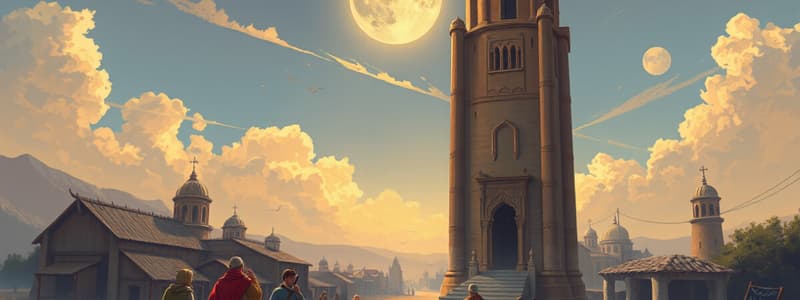Podcast
Questions and Answers
What facilitated early travel and trade among the Sumerians?
What facilitated early travel and trade among the Sumerians?
- Development of steam power
- Invention of the wheel (correct)
- Creation of travel agencies
- Establishment of postal services
Which event marked the beginning of the 'Grand Tour' for gentlemen seeking education?
Which event marked the beginning of the 'Grand Tour' for gentlemen seeking education?
- Publication of travel guidebooks
- Start in 1670 (correct)
- Establishment of the Olympic Games
- Formation of renowned universities
What was a significant change in tourism during the Industrial Revolution?
What was a significant change in tourism during the Industrial Revolution?
- Increased urbanization (correct)
- Focus on educational travel
- Decline of pilgrimage travel
- Introduction of ocean liners
Which form of early tourism involved travel to places of worship?
Which form of early tourism involved travel to places of worship?
What was a primary attraction for travelers at the end of the 18th century?
What was a primary attraction for travelers at the end of the 18th century?
What advancement in the 19th century significantly impacted transportation?
What advancement in the 19th century significantly impacted transportation?
Who were primarily the brave travelers during the Medieval period?
Who were primarily the brave travelers during the Medieval period?
What was the main focus of travel after the Industrial Revolution?
What was the main focus of travel after the Industrial Revolution?
What began as healing methods during the 18th century?
What began as healing methods during the 18th century?
Which aspect of travel for the British was emphasized during the Renaissance?
Which aspect of travel for the British was emphasized during the Renaissance?
Flashcards are hidden until you start studying
Study Notes
Early Tourism
- Travel and exploration are innate human behaviors; the Hebrew term Torah signifies studying and seeking knowledge.
Forms of Early Tourism
- Business Travel: Primarily driven by trade activities.
- Religious Travel: Included significant events like Crusades and pilgrimages.
Business Travel
- Sumerians: Innovations such as money, writing, and the wheel advanced trade and travel.
- Greeks and Romans: Established trade networks and engaged in leisurely travels; Greeks created the Olympics, while Romans visited friends.
- Development of communication and infrastructure (roads and inns) enhanced travel, largely due to Roman innovations.
- Transportation: Horses enabled travel of 100 miles in a day, with mutations (horse-changing stations) placed every 6 miles, akin to modern gas stations.
Religious Travel
- Pilgrimages: Important religious journeys to sacred sites.
- Notable pilgrimage routes include locations in Rome and Jerusalem.
- St. James of Galicia: Major destination for English pilgrims in the 14th century; permits were first required in 1388, resembling modern passports.
Tourism in the Medieval Period
- Travel experiences declined due to dangers post-Roman Empire; roads became unsafe and travel burdensome.
- Only the most committed, such as pilgrims and crusaders, continued to travel amidst the dangers.
Tourism During the Renaissance and Elizabethan Eras
- The Renaissance spurred educational travels, chiefly promoted by the British.
- Under Elizabeth I, court aspirants were encouraged to travel across the continent to enhance their knowledge.
- The Grand Tour (1670) became a cultural pilgrimage for young gentlemen, lasting up to three years and encompassing key European cities.
Tourism in the 18th Century
- Travel evolved from educational purposes to leisure activities, predominantly among the upper class.
- Popular destinations included France, Italy, Venice, and Florence, blending intellectual pursuits with enjoyment.
- Travelers sought health benefits at spas, which emerged around this period.
- Spa - Medicinal Baths: Origin of the term spa relates to the Wallon word for "fountain."
- Turnbridge Well in Kent: Renowned for its healing waters since 1660; evolved into resorts with entertainment offerings.
Tourism During the Industrial Revolution
- This era introduced significant changes to tourism dynamics, elevating scale and access.
- Increased urbanization and regular employment allowed more people to afford travel.
- Individuals sought temporary escapes from responsibilities, favoring countryside and seaside retreats, leading to the emergence of working-class leisure travel.
Studying That Suits You
Use AI to generate personalized quizzes and flashcards to suit your learning preferences.




